- Lifestyle & Sports
- 19 Jul 23
Vera Pauw: "We come together to play football, but what's important is that the players are happy, and love is the best thing to happen in your life"

At the start of Ireland’s Women’s World Cup campaign, few would have predicted that we’d be preparing to pack our bags to travel to Australia. But we are – and the excitement is inexorably mounting. Here, we speak to the controversial Irish manager Vera Pauw – and discover a woman of intelligence and substance. Just don’t try to tell her that there should be more League of Ireland players in the squad... Images (in part) by Stephen McCarthy / Sportsfile.
There’s scarcely been a dull moment since Dutch woman, Vera Pauw, took over as head coach of the Ireland women’s national soccer squad in 2019. Her disciplined approach to coaching and her apparently blunt delivery was new to Irish players. But it was also mostly in tune with the increasingly professional attitude required of players in the women’s game.
Pauw set about her task of managing the Irish team with gusto, instilling new belief in the players and bringing the team to the verge of their first qualification for a European Championships (Women’s Euro 2022). She then tapped into the sense of disappointment wrought by that narrow failure, to finally get Ireland over the qualification line for their inaugural appearance in the World Cup finals this month, by beating Scotland 1-0 in a tension-riddled play-off game in Hampden Park, Glasgow, in October 2022.
Watch her in action, whether on the sideline or speaking to the media, and you can see that Vera is a determined and forthright individual, battle-hardened from her experiences, both on and off the field, in the world of football. But, beneath the surface toughness, there is also a warm person, who has the ability to create a family-like atmosphere for her players.
In many ways, her regime would remind you of the heady days of the era when Jack Charlton was in charge of the Ireland men’s team.
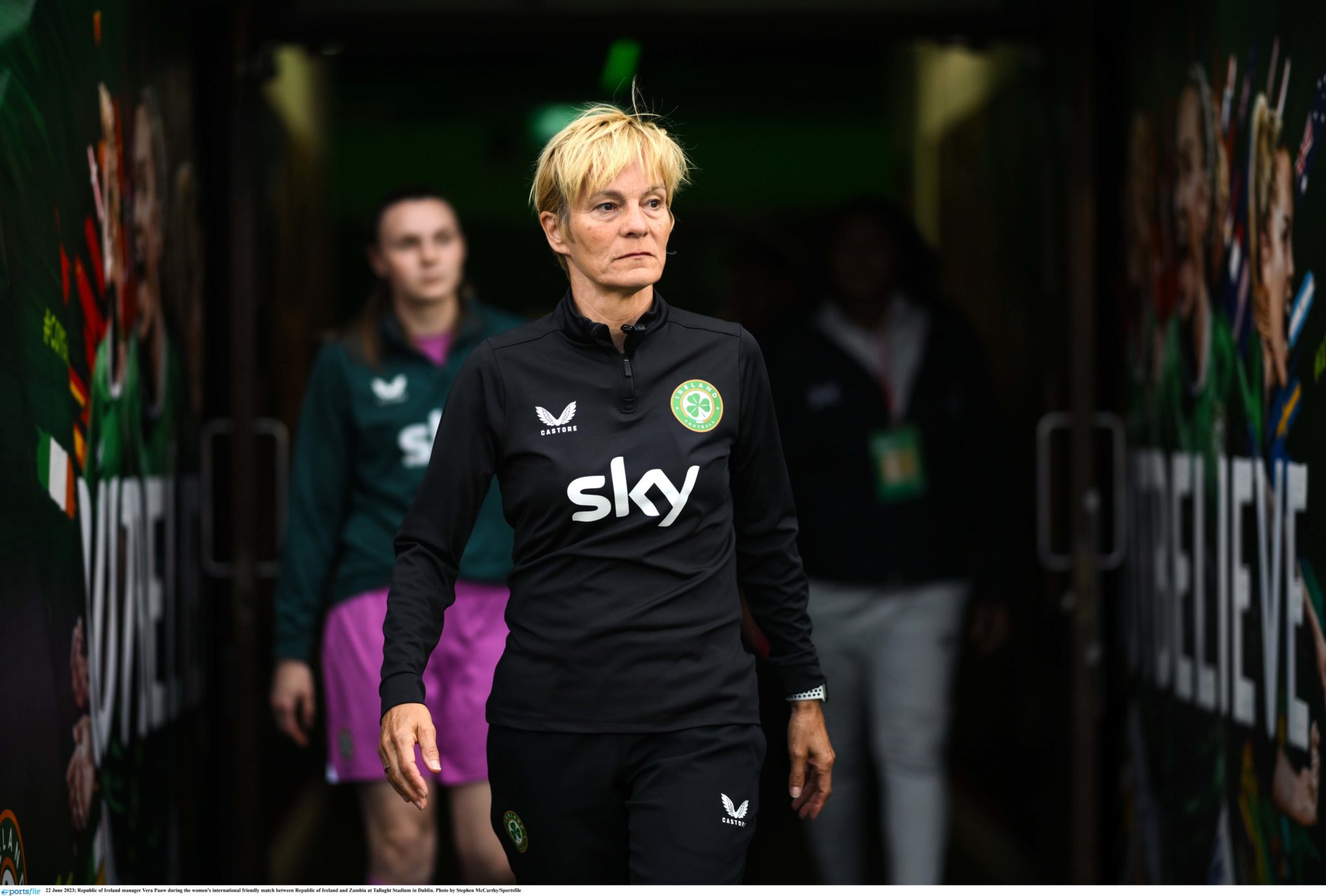 22 June 2023; Republic of Ireland manager Vera Pauw during the women's international friendly match between Republic of Ireland and Zambia at Tallaght Stadium in Dublin. Photo by Stephen McCarthy/Sportsfile
22 June 2023; Republic of Ireland manager Vera Pauw during the women's international friendly match between Republic of Ireland and Zambia at Tallaght Stadium in Dublin. Photo by Stephen McCarthy/SportsfileA LOT OF INJURIES
Irish women’s football has developed rapidly over the past 10-12 years. The FAI have committed to advancing the Women’s National League at home and the established League of Ireland clubs have – to different degrees – played their part in spurring what has become a huge leap forward.
The international team has seen a similar kind of improvement, first under the previous manager Colin Bell and latterly Vera Pauw herself. She has brought the Irish diaspora increasingly into play in the senior international set-up, most recently fast-tracking players who qualify under the “granny rule”, like US-born Sinéad Farrelly, into her squad since World Cup qualification was achieved.
There are critics who argue that this is inevitably at the expense of domestic players. There are only two League of Ireland footballers named in the 23-strong squad that will travel to Australia for Ireland’s opening World Cup game. However, the players most entitled to be upset at their omission – Jamie Finn (Birmingham City), who started six of our nine World Cup qualifying games, and Leanne Kiernan (Liverpool) – are both playing professionally in the UK. As indeed are Saoirse Noonan (Durham Women’s FC), the injured Aoife Mannion (Manchester United) and Megan Campbell (Liverpool), all of whom also missed out.
So what was the thinking behind the policy of recruitment?
“We started with the existing team and we started to grow,” Vera Pauw explains. “We put the players under a certain amount of pressure, but we did not over-ask as there are some things you cannot reach and you can get frustrated. By asking for more once or twice you can see what they are ready for. This step-by-step development is what I am proud of.
“Picking the best players in a small nation is not so difficult, and four years on now, it’s still developing. New players are coming in. The players we have in from overseas, they need to have a passion to want to play for Ireland, be born in or have a connection with Ireland.
“We had some of these players in the squad already,” she adds, “but, after qualifying, we had more of these come forward. The thing about more recent additions like Sinéad Farrelly, Marissa Sheva, and Aoife Mannion, for instance, was that they approached me themselves and they showed such passion about wanting to play. But they also have to be better than what we have, in order to make the squad. If they were better, embraced the culture we have and showed they wanted to be part of it, they were accepted immediately.”
Some critics claim that you are ‘hung up’ on the fitness of players…
“It’s the kind of fitness,” she clarifies. “Players need to be football ready. What many clubs and players used to do, and some still do, for instance, is a lot of weight-lifting. What I am looking for is the ‘snappiness’, dynamics, being able to play an intense game – and the ones who can do that are not usually the ones with the biggest muscles.”
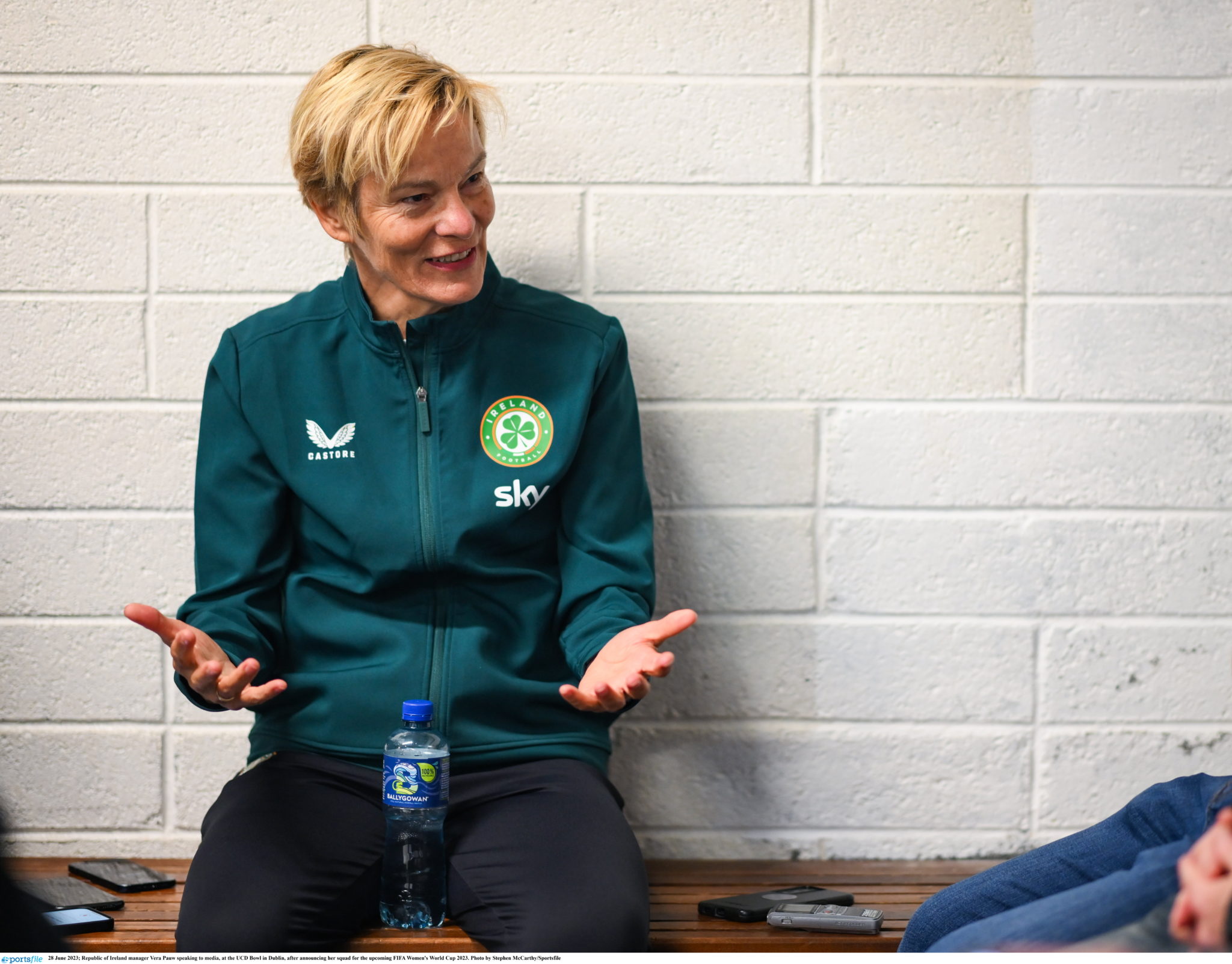 28 June 2023; Republic of Ireland manager Vera Pauw speaking to media, at the UCD Bowl in Dublin, after announcing her squad for the upcoming FIFA Women's World Cup 2023. Photo by Stephen McCarthy/Sportsfile
28 June 2023; Republic of Ireland manager Vera Pauw speaking to media, at the UCD Bowl in Dublin, after announcing her squad for the upcoming FIFA Women's World Cup 2023. Photo by Stephen McCarthy/SportsfilePauw has developed the concept of a ‘reserve’ squad training session, held monthly in the home of the FAI, in Abbotstown. The aim is to increase the fitness and training of the top players in the domestic Women’s National League (aka League of Ireland Women).
The frequency of these home-based squad sessions was increased to once a week from January to May. As a result, you could see the fitness of certain League of Ireland players increase significantly in the first half of the year, as they trained with their clubs and with Pauw’s squad. What confused people in the domestic game is that Pauw only took two of them (Aine O’Gorman and Abbie Larkin of Shamrock Rovers) into the first official Ireland camp of 2023.
“For the home-based squad players, we had a special programme,” Vera explains. “It was to increase their match-fitness – their snappiness and their explosiveness – to a higher level so they could execute the tasks at hand.”
There are many who feel that the brilliant Shelbourne No 6, Alex Kavanagh, should have been given more of a chance. After a down-period recovering from an MCL injury, and getting Covid, she has worked her way back to fitness. She’s only 23, has been a serial underage international and has two senior caps under previous regimes – yet none under Pauw. What’s going on?
“If there was one player the home-based programme really helped it was Alex,” says Pauw. “The game I noticed it vividly was in the Shelbourne vs Shamrock Rovers game and, in injury time in the game, she was still going from penalty box to penalty box. She’s developing very, very fast. I’ve spoken with her. She’s very talented, but she’s not quite there yet. You need to be better than Denise O’Sullivan, Megan Connolly, Lily Agg…
“It’s no secret that the women’s national League of Ireland is not at the level of the WSL in England,” she adds. “Those home-based sessions have been really, really important to get Aine (O’Gorman) and Abbie (Larkin) on the same level as others in the squad. The data shows us that they are now on the level of the others, so it has been incredibly successful.
“There’s others too. Erin (McLaughlin) and Tara (O’Hanlon) were in the squad. The only reason Tara did not make the final World Cup squad is because Izzy Atkinson was ‘jumping up’, and we’ve all seen that. The home-based sessions and the way we’ve approached them with explosivity circuits, with power, playing against boys, that has made a difference. Abbie would not be at the level she is now without that. Aine, of course, has so many caps and such training behind her, and she’s used to playing with boys all the time. But the home-based sessions have been incredibly successful.”
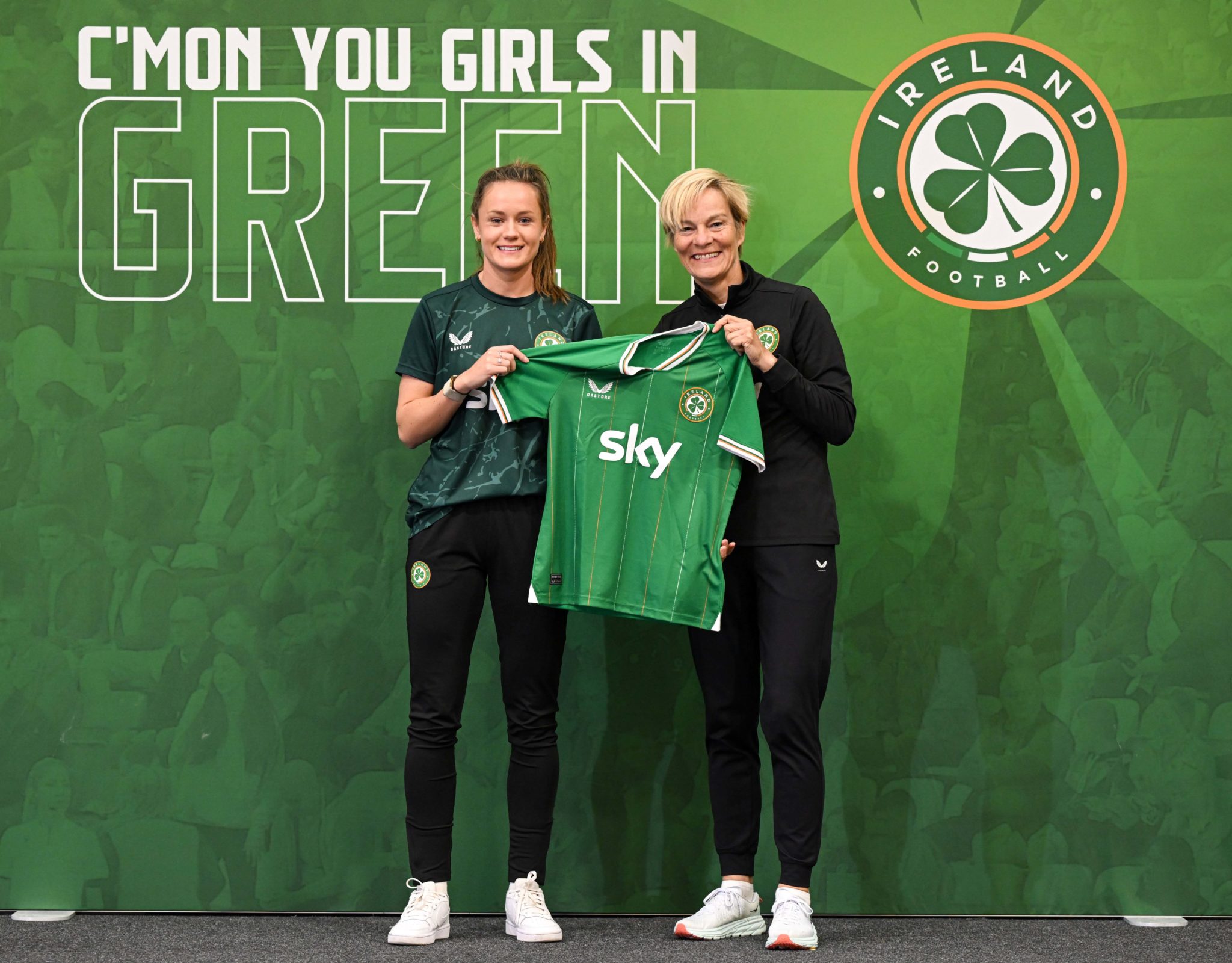 29 June 2023; Heather Payne is presented with her jersey by Republic of Ireland manager Vera Pauw during a Republic of Ireland FIFA Women's World Cup 2023 squad announcement event at O'Reilly Hall in UCD, Dublin. Photo by Stephen McCarthy/Sportsfile *** NO REPRODUCTION FEE ***
29 June 2023; Heather Payne is presented with her jersey by Republic of Ireland manager Vera Pauw during a Republic of Ireland FIFA Women's World Cup 2023 squad announcement event at O'Reilly Hall in UCD, Dublin. Photo by Stephen McCarthy/Sportsfile *** NO REPRODUCTION FEE ***Vera clearly puts huge emphasis in the fitness programme.
“Amber Barrett hadn’t been at a club at one stage,” she explains, “and she asked me what could she do to stay match fit. I gave her a very simple programme and she did it beside her (next) club’s training or instead of a game she didn’t play. Very simple and she got completely fit. After the World Cup, probably closer to the end of the year, we will have a conference and we will share every single detail with the (League of Ireland Women) coaches.”
On the other hand, Pauw brought in Sinéad Farrelly, a 33-year old player based in the US, who hasn’t played regularly in recent times. She’s described as a player who can put her foot on the ball to give the team ‘a few extra seconds’. Alex Kavanagh has been doing that throughout her career. And she’s 10 years younger.
“Sinéad is not playing at No 6 like Alex. She’s playing in the pocket. She’s a different kind of player, and has different tasks,” reasons Pauw.
My own view is that Alex can play in any position around the middle of the park and even No. 10. With Shelbourne, she has been doing exactly what Vera said she wanted: being a defensively-minded ball player in the middle of the park who can put her foot on the ball, buy a few extra seconds, defend, ping visionary passes that lead to goals or create opportunities. She’s also a regular goalscorer as a dead ball specialist.
I tell Vera I have a dream for the Ireland women’s national team: Alex Kavanagh at No 6 and the precocious teenager Ellen Molloy of Wexford Youths at 10.
“It may happen in the future,” Vera says. “Ellen was breaking through into the team just before she got that knee injury. She’s just 18. She has time.”
Was there any reaction from the squad about a player like Sinéad Farrelly coming in so late to the team?
“No, not at all,” says Pauw. “I asked Katie McCabe. And remember we’ve had a lot of injuries and there have been changes in the squad because we had gaps, and it’s like we get stronger as a unit. And because we are getting stronger, the players that are not injured – and let’s keep it like that – are embracing it completely.”
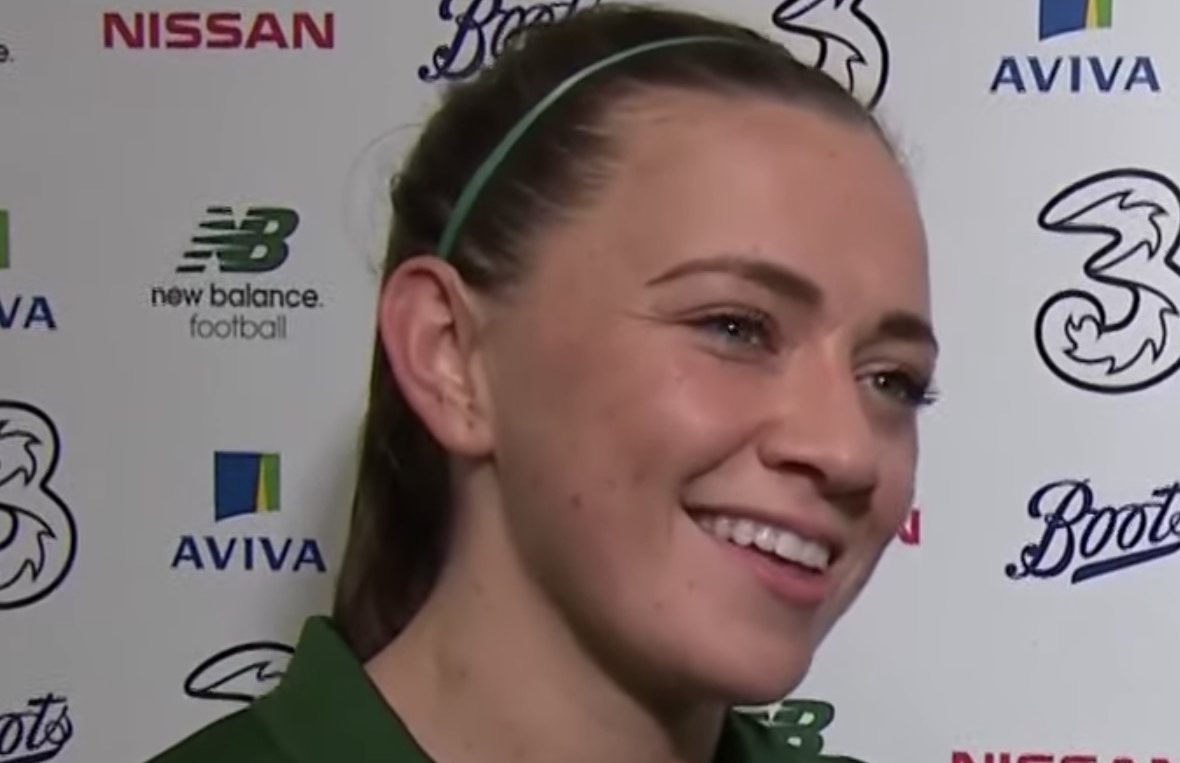 Ireland Captain Katie McCabe
Ireland Captain Katie McCabeCOMPLETELY DIFFERENT ISSUE
Highly talented teenagers like Ellen Molloy and Abbie Larkin are just two examples of the rapid development of younger players in the national league. Is Vera encouraged by what’s happening in Ireland?
“What I am worried about is that less and less female players are starting to play with boys in childhood,” she cautions. “Because there’s more girls playing the game, therefore everyone needs to be in the same girls team and now they’re being put in the team because they are girls not because that is their level.
“In the past, players like Katie McCabe, Denise O’Sullivan, Megan Campbell, all these big players and more (including Alex Kavanagh – Ed) played up to age 12, 13 or 14 with boys – and we’re losing that. I hope that the intensity of the game at the top level will go up, because our players have to face the likes of Australia. That’s the level the players need to be ready for.”
In terms of the Irish squad now and younger players coming through, Pauw is able to watch live games every week either in person or via the FAI’s online LOITV (League of Ireland TV). Pauw finds it invaluable.
“Without LOITV I wouldn’t be able to function like I do now because I can see LOIW players every week. It’s been of immense help. If I have been at a game, I can go back and see the clips again. It’s fantastic.”
As a coach in the women’s game, is there an advantage in being female?
“Since year 2000, all the major tournaments – World Cups, European Championships, Olympic Games – were won by teams with women coaches. Only one, Japan in 2011, had a male coach, and they were especially driven by playing for their country after the tsunami. So, it seems that women can bring that bit extra to women’s teams, and maybe that’s because as a woman you understand the pressure there is on female players.
“We have a bias in our stomachs that we need to take care of others and we need to take care of harmony. I think that’s why women in charge of women’s teams have a little extra edge. That is my experience. That is why there are so many examples of women’s teams who had male managers becoming champions when a female coach comes in.”
Pauw herself was influenced by legendary Dutch coach Rinus Michels, the man who in credited with inventing ‘Total Football’, and who also influenced top coaches like Johan Cruyff, Pep Guardiola, and more.
“My husband (Bert van Lingen) was his assistant,” she explains. “Rinus was also called ‘The General’ because he was so firm in an era where professional attitudes were evolving from amateurism. At a social level, he was also such a lovely, caring, empathic human being. He was such an incredible person. I’ve been lucky to call him my friend.”
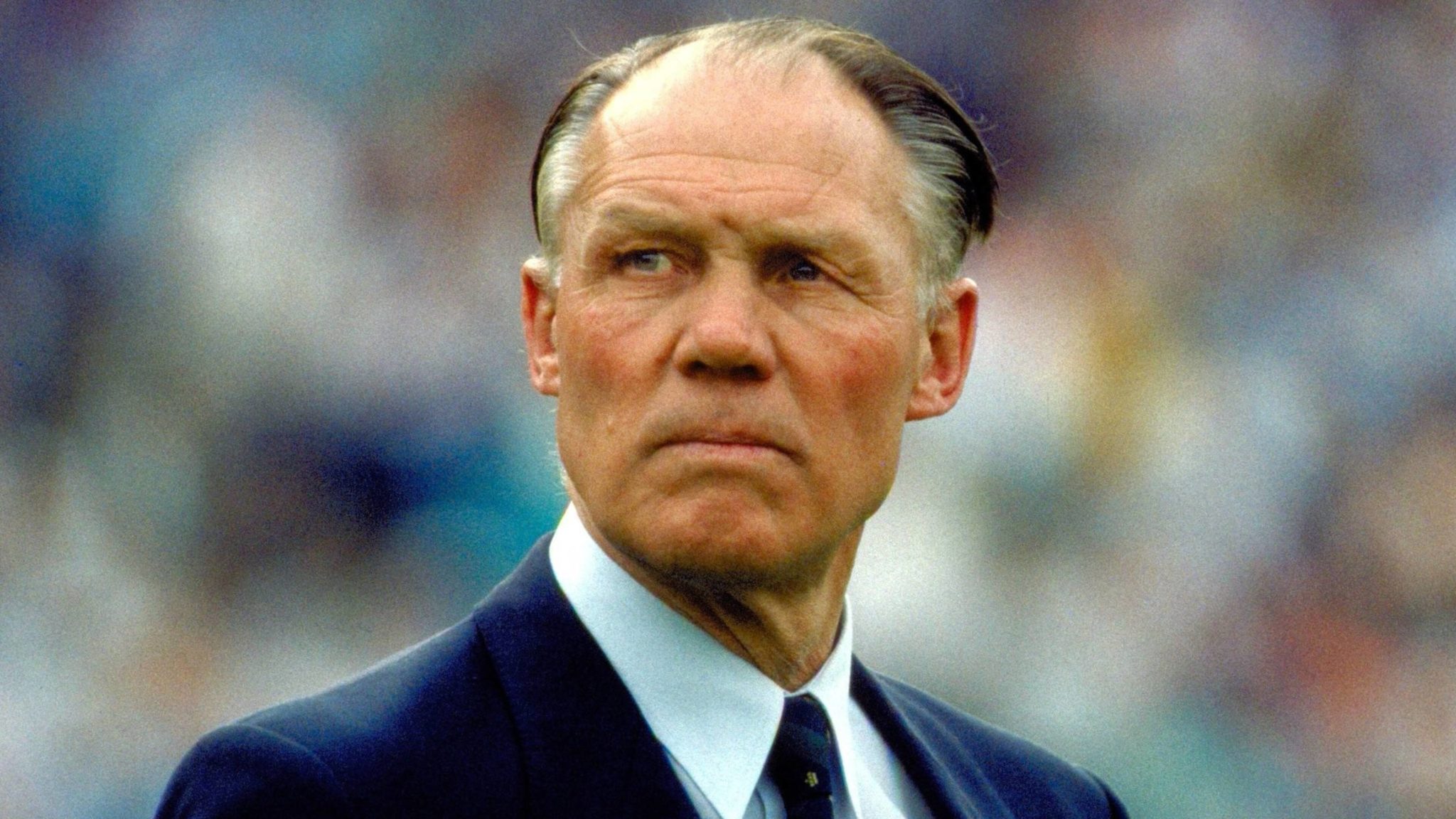 Rinus Michels.
Rinus Michels.How would you describe yourself as a coach?
“You’d need to ask others. When I became a coach, I spent six years in Scotland as national coach, and they were training one or two times a week and team rules helped them to express themselves. After six years, I went back to the Netherlands and I could not believe my eyes. When I left, it was about the performance and when I came back it was about being popular, with two trainings per week and they were tweeting things like #topsport without putting more energy into it than training twice a week.
“In international sport, that is not enough. I had to help them by being firmer. We said to each other, what do we want to convey: that we are nice females; that we are sports people; or that we are soccer players? I said: ‘Tell me, it’s up to you’. So, they said that, firstly, they were football players; they were athletes, second; and they were happy to be women, third. So, they had to show that mentality to people. They had to get fitter and fitter. They had to win things.
“The male footballers in the Netherlands did not want us to have success, they were happy with us treating it as a hobby and nothing else. Then, suddenly, it changed and we attracted more viewers. The marketing department were still telling us no-one wanted to watch us, even while we were breaking records! And then we wanted to organise the Women’s European Championship finals in 2009 and the Dutch FA just gave it away. They swapped it with Finland, because they didn’t want to have it! They didn’t want us to succeed.
“That is why, as a team, we needed a few strict rules. I went to Russia – and they needed team rules there that told them what to do both on the pitch and off the pitch. I went to South Africa, and it was the opposite: they were street football players and they played in relatively tight spaces. They needed to play in big spaces, they needed freedom of expression to get their street football skills onto the pitch, and within a certain structure. And I needed to protect them while they were exploring themselves a players.
“Then, I came to Ireland where the team already had a strong base of professionalism, and I met a core group, who were very mature and professional in their approach. They wanted more. So, we put in a lot of work: training regimes, everybody is to be at video sessions, everybody has to be on time for the bus – because the team needs to function. But outside of that they were allowed freedom because they can handle that.”
You seem to have developed a club or family feeling with your squad.
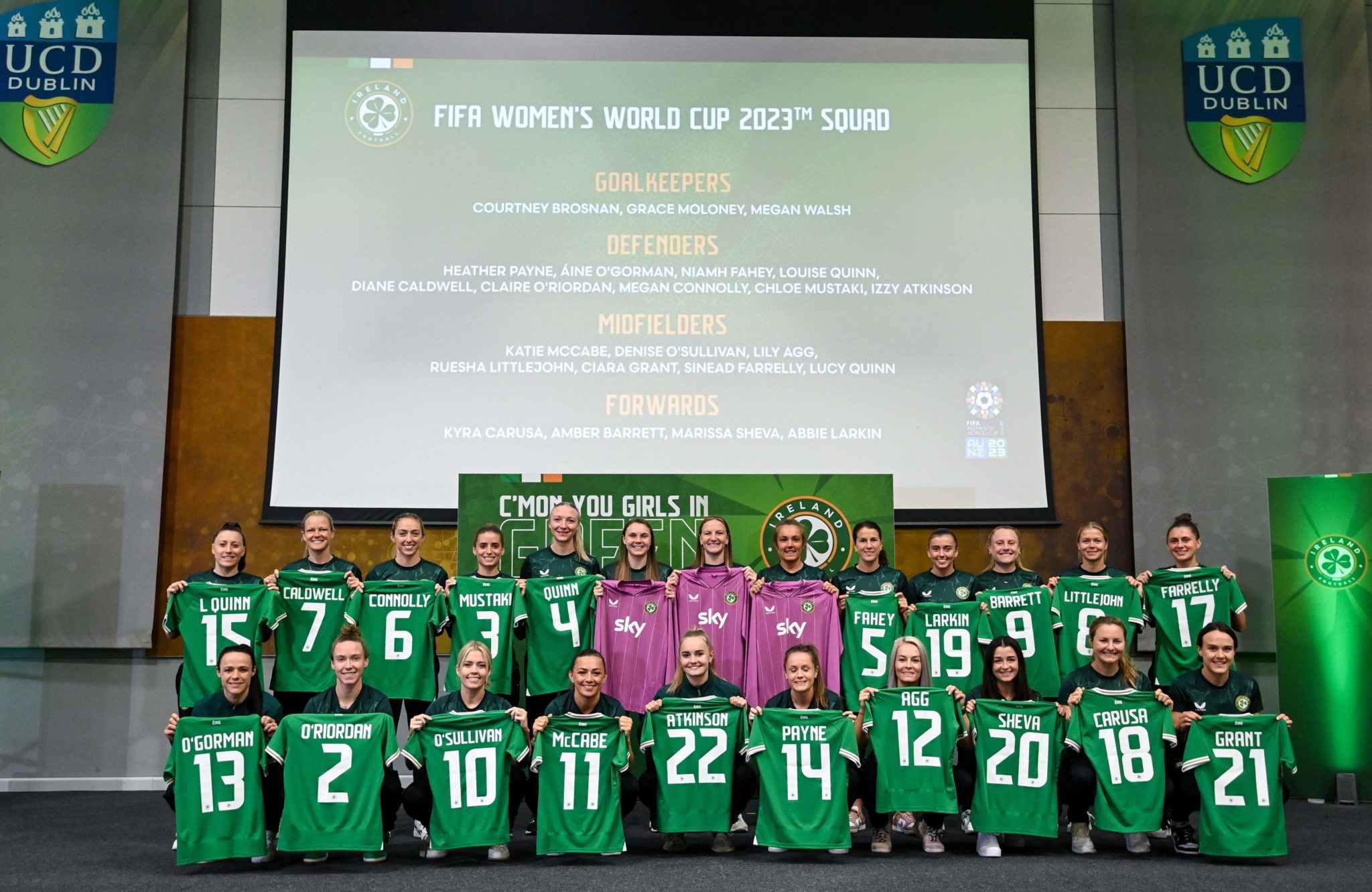 29 June 2023; Republic of Ireland players with their jerseys during a Republic of Ireland FIFA Women's World Cup 2023 squad announcement event at O'Reilly Hall in UCD, Dublin. Photo by Stephen McCarthy/Sportsfile
29 June 2023; Republic of Ireland players with their jerseys during a Republic of Ireland FIFA Women's World Cup 2023 squad announcement event at O'Reilly Hall in UCD, Dublin. Photo by Stephen McCarthy/Sportsfile“I had to select pictures and I went through all those celebrations, and the hugs are real hugs,” she says. “It really touched me, looking at them. When you see the pictures, you can see the bond we have, that we went through so much together. But it’s not only that, it’s the respect that these players have towards each other, towards the coaches and staff, the environment that’s been created, being honest. The only problem we had is when a player is not being honest, and that happened at the very beginning and it never happened again. As a group, we do not accept that.”
Did the controversy about singing the ‘Up the ‘Ra’ song put a strain on the squad’s unity, not least with the media trying to identify the player who put the footage out on social media?
“Not at all. We had each other’s back. It happened. We knew, after we had talked with each other, that it was not okay, it was wrong, because even if you heard only one person sing it, it was wrong. We do not hurt people. That is our starting point: we do not hurt each other and we have respect for others.”
Was there any action taken against the player who shared the footage of the squad singing that song?
“No, she got such support from us, more than anyone else,” she reveals. “Posting something out of the dressing room is not acceptable, but that has nothing to do with the fact the song has its meaning, the historical background. If she would have posted anything else, we would also have spoken to her. That’s a completely different issue.
“The issue, in that instance, was not the posting, but the song itself. If I had been there, I would not have recognised that song because I’m a foreigner, but that does not mean that I should not apologise, because I am responsible for the team and that’s why I took it upon my shoulders. I am responsible in the good times, and I am responsible in the not so good times.”
FREEDOM TO PLAY
There’s been a seismic change in attitudes to sexuality and social issues in Ireland in the last 25 or 30 years, be it contraception, marriage equality, and most recently abortion. I read an article in a newspaper recently which referred, in passing, to ‘Aine O’Gorman and her wife Rachel…’ No fanfare, just the facts. Has Pauw been aware of the cultural changes in Ireland?
“Yes, and football has played a big role in that, because lesbian women were always welcome in the game.”
Why more so than the men’s game?
“Because football is the first sport in this area of the world and it has been very much macho related,” she opines. “I think women’s football has shown that it is about love. It’s not about whether it’s a man or a woman, it’s about love. I always say that I hope nobody thinks or has fantasies about what I do with my husband in the bedroom, but as soon as it’s about two men or two women, suddenly people give an opinion about that. Why? We come together to play football and what for me is important is that the players are happy, and love is the best thing that can happen in your life.”
There have been several high-profile instances of female footballers kissing each other openly – for example, Chelsea and Australia star, Sam Kerr and Kristie Mewis of US club, Gotham FC.
View this post on Instagram
“Yes, but they also wanted to show their relationship,” Vera says. “But there were women on the team who were not so fond of that happening. But the way Ireland’s Katie MCabe and Ruesha Littlejohn are dealing with it, standing up for their rights of loving each other, is a much better way of dealing with it. You don’t have to provoke or sensationalise it. I’m not going to kiss my husband in the middle of the pitch in that way. So, it has nothing to do with women, it’s using football to showcase. Whereas Katie and Ruesha just love each other – there is no question about it – and they use the platform to help others. That is something I admire.”
How does the Netherlands compare with Ireland?
“We talk a good game over there. We say we are progressive, and maybe back in the 1960s we were, but our desire to be ahead of others has stopped us taking the next step. Whereas Ireland, which was far behind, has woken up and is now far beyond the Netherlands. Here in Ireland, you’re safe, you can be who you are, people stand up for you. In the Netherlands, we went backwards and no one is standing up for each other. A huge difference.”
Halfway through Ireland’s World Cup qualification campaign, your assistant coach, Eileen Gleeson, left her post to join Glasgow City, with Tom Elmes replacing her in the Ireland set up. Was that disruptive?
“No,” she replies. “Tom was a head coach who became my assistant coach and that was not an easy step, and we knew that, and we’ve grown into a situation where we function really well. The things is, Eileen left halfway through the campaign, so she contributed a lot to the success that we now have. I want to highlight that. It was a chance that she really wanted to take, so I did not stop her from doing that. If someone wants to take a step at that moment, then who am I to stand in their way? I was delighted for her.”
You must like seeing her back in the FAI, as Head of Women’s Football.
“Oh yes, and she has such knowledge of the game. The people who did the interviews said she was by far the best candidate.”
The experienced Peamount United player, Karen Duggan, was critical of the Ireland team’s playing style, saying that they are overly defensive and unlikely to progress beyond the group stage of the World Cup without a more ambitious approach.
“What she doesn’t realise is that we scored more goals than Sweden in qualifying,” counters Pauw. “We beat Finland twice, we drew against Sweden, we scored the same amount of goals as Slovakia. Sweden adopted our playing style against Georgia. In the first game they barely got through it, so they copied us and the way we were constantly attacking that goal.
“That’s why I found it unfair from a former player – because she could have seen that. That’s the only thing that I have said about it. Everybody may be critical – but be fair. We’re Ireland, we’ve qualified for the World Cup and that’s a performance that nobody could have forecast. However, we knew we could qualify.
“What she seems to be saying is ‘that’s nice – but we can’t go further in the tournament’. This team is improving every single game. Look what we’ve done recently against the USA. And then it’s because Kyra Carusa was ready. That is why we played the way we played. We have a target player now that gives us the opportunity to put Kyra and Katie outside which can bring a different style.”
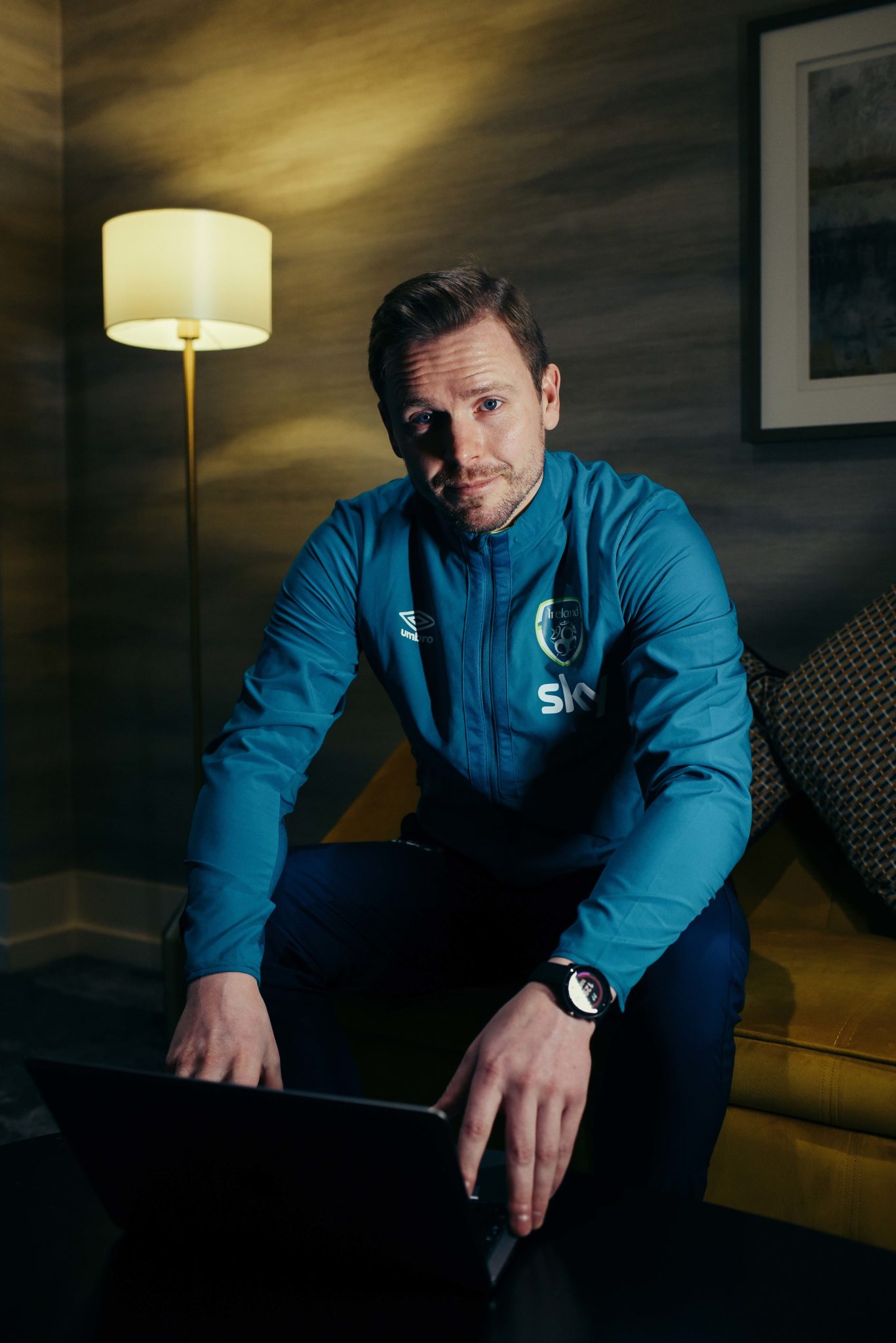 Tom Elmes. Copyright Miguel Ruiz.
Tom Elmes. Copyright Miguel Ruiz.You must have a rock solid relationship with Katie McCabe?
“Yes, but not only her. Also, Denise O’Sullivan, Megan Connolly, Courtney Brosnan – Kyra Carusa, too, as a spine player. With Katie, I love players that are different. We can clash sometimes but a clash can be good. We never have a fight. But we feel we can confront each other, if necessary. ‘We need to talk’. Or she might say ‘I don’t agree with such and such’, or ‘The team thinks such and such’.
“I treat Katie’s role carefully because she is a very good player herself first of all. I take the pressure off her sometimes, because she needs the freedom to play.”
NO STONE UNTURNED
I raised this issue with your assistant coach, Tom Elmes, in a Hot Press interview a few months ago and would be interested in your opinion, too. People are now talking about menstrual cycles, and their impact on female players’ physical and mental performance. Might that be a factor in players picking up injuries?
“Suddenly, everyone now wants to research this,” she says emphatically. “It’s a wide area, and I have seen some ridiculous outcomes. I have been busy since 1998 on this and no-one wanted to listen. There is a correlation between menstrual cycles and injuries. I knew that before anyone investigated it. As a player, I had my two major injuries a couple of days before my menstrual cycle started.
“I started looking at this when I was with Scotland, then the Netherlands, and then South Africa and I was hearing coaches saying these ligament injuries were bad luck. And I would say, ‘It’s not bad luck, it’s your training regime’. And we looked at their recovery periods from training and it looked like they were not recovering and they were fatigue injuries related to the menstrual cycle.
“It came out that their nutrition intake was a key factor and was connected to their slow recoveries. We used a nutrition programme over the next two years that resulted in really healthy, strong, fit women and much less injuries. I created, with experts, this programme for injury prevention within that menstrual cycle, that protects women from getting ligament injuries which can happen at certain stages of the cycle. And that is the most important part.”
A report by the US National Women’s Soccer League (NWSL) caused some controversy when Vera Pauw was named in it, in December 2022. It claimed that during her time with Houston Dash (immediately prior to her Ireland stint), Pauw attempted to exert excessive control over her players’ eating habits. She denied any wrongdoing.
Her response was brave: she came out fighting. She is banned from working in the NWSL unless she accepts responsibility, yet the expected hullabaloo when she brought her Ireland team to play the US in two friendly matches recently failed to materialise. Did she consult with anyone about her strategy for addressing the report?
“No, but others said I should sit in a corner and do nothing and it would all blow over. No way!” she says decisively. “The views I have held in my life and now these stories being told, by one or two players, just lies – and nobody’s running my story! If I would have done it, then I could have said, ‘Is that not the task of a coach?’ But I hadn’t even done it because I protect my players always from everything. I called the president of Houston Dash and I said, ‘Tell me, if there is one moment that you think that we did not understand each other’ and he said, ‘No. The only thing that I can remember is that you always protect your players and that you always explain to your players what the next step is. You were always there for the players, even at the expense of yourself’.
“The captain was coming back from an ACL injury and I could have used her much earlier because she wanted to play, but I used the return to play protocol to the extreme, because she could not rupture her ACL again. And that was my responsibility. And he even came to the training ground with her to talk with me and I told her the same thing, that I was not going to play her. ‘I am protecting you,’ I said. She was the best player and I would have liked to play her, but I knew it was not good for her. So, all the ridiculous things that were put into that report… I was so angry, I said, ‘Come over here, ask me anything you want to ask’.”
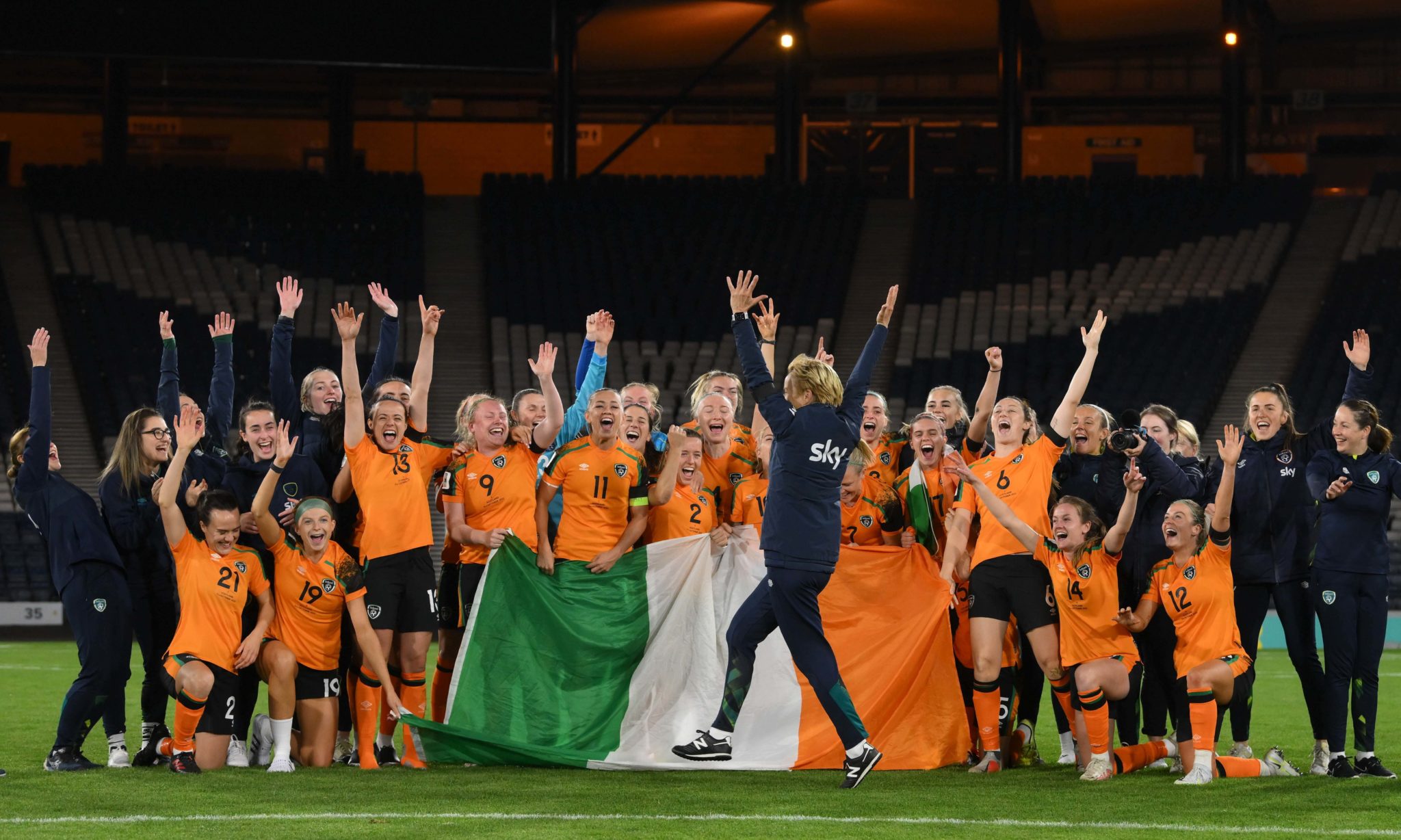 Republic of Ireland manager Vera Pauw celebrates after the FIFA Women's World Cup 2023 Play-off match. Photo by Stephen McCarthy/Sportsfile
Republic of Ireland manager Vera Pauw celebrates after the FIFA Women's World Cup 2023 Play-off match. Photo by Stephen McCarthy/SportsfileIt raises the issue of whether it is acceptable for anyone to just throw accusations at a person and place the onus on them to prove their innocence.
“It seems they can do whatever they want,” she says, somewhat exasperated. “I have proven I’m innocent. What has happened to me has now happened to 226 elite female coaches across a lot of sports in the US. I talked with the lawyer for those coaches and he said, ‘The difference between you and the other 226 coaches is that the other coaches could have said something that could have been interpreted differently but you’ve proven you haven’t even said those things, that you haven’t even done those things.’”
Pauw is not signing a new contract with Ireland before the World Cup, which is pretty standard for coaches these days. She has said she wants to wait. I ask her about this. Our eyes connect. We laugh!
“Of course we have spoken about it, but I have had a very tough year, and it’s still not over. But I have grown stronger from it. I feel free. We trust each other. We don’t need to have an early decision. Whatever decision is coming, it is based on mutual respect and not that one side wants it more than the other, or something. They’ve given me the time that I need to be ready for it.”
On the flip side, the football authorities are not giving football associations in Europe a lot of time to be ready for the UEFA Women’s Nations League, in which Ireland have been drawn against Hungary, Northern Ireland, and Albania.
“It’s three weeks after the World Cup, it’s ridiculous!” Vera exclaims.” But it’s not UEFA, it’s FIFA, as FIFA set the match windows.”
Before that, of course, Ireland are facing some very strong teams in our World Cup group, starting with the co-hosts Australia (20 July); Olympic Champions, Canada (26 July); and African Champions, Nigeria (31 July).
“And if we get through that, we get the European Champions,” she smiles, “and, then, if we get through that, it’s potentially the World Champions!”
Can Ireland win the World Cup?
“Let’s be realistic. Let’s not say ‘yes’. It’s our first time, and we are not even there yet. We’ll do the best we can, to get as far as we can. Whether that is the group stage or the last 16 – who knows? We’ll take it step by step and we’ll take everything out of this World Cup experience that we can.”
Are we going to get out of the group?
“Anything is possible, it’s football. But we need to be realistic: It’s our first time qualifying, it’ll be our first time in front of over 80,000 spectators… but we’ve also been growing every single game and we aim to leave no stone unturned, to make Ireland proud – and at the end of each game we’ll see what’s good enough or if we were missing something.”
View this post on Instagram
NATURAL PROCESS
As coach, Vera Pauw has got Ireland to the World Cup, Holland to the European Championships semi-final and South Africa to the Olympics. Is getting Ireland – with a relatively small player base – to the World Cup her greatest achievement?
“This has been the greatest achievement because of everything that has been going on around me,” she admits.
There’s been a lot of stress points…
“I am proud that, together with my staff, we could deliver the quality we needed to get this group step-by-step to where we are,” she says. “And I’m proud of the group for the way they‘ve handled it. We kept any outside negativity away from the pitch, away from the training ground, from the video sessions. That is why it is the top performance of my career.”
There must be huge egos in an international team dressing room. For Vera Pauw to produce a harmonious, spirited and focused squad who have qualified for the WC is exceptional and historic.
“Thank you. I have tried to do it like that with my past teams but, with Ireland, it has been such a natural process because they have it in their DNA,” she reveals. “As a group, they want to go forward and stand up for each other, their fellow players and the whole squad. The Dutch players have it in their DNA to be for themselves, very individualistic. I did get that team spirit from them in the end, but here it was such a natural process with the DNA of the Irish players.”
On the 50th Anniversary of women’s football in Ireland, this really seems like ‘a moment’.
“The outcome of the performance of the national team is also the outcome of 50 years of women’s football here,” Vera Pauw says. “It’s also the outcome of the grassroots work, the support we have.
“Everyone is of the same positive mentality,” she concludes. “We are together.”
Read the full World Cup special in the new issue of Hot Press, out now.
RELATED

- Lifestyle & Sports
- 18 Sep 25
Student Special: Travel Options Beyond The J1

- Lifestyle & Sports
- 20 Jul 23
President Higgins wishes Girls in Green luck at World Cup

- Lifestyle & Sports
- 17 Jul 23
Heather Payne: "I wanted us to win so badly, I was losing my voice with the emotion"
RELATED

- Lifestyle & Sports
- 05 Jul 23
Come On Ireland! Hot Press Releases Zrazy Single Celebrating Women’s World Cup

- Lifestyle & Sports
- 28 Jun 23
Vera Pauw names 23-player Women's World Cup squad in announcement video

- Lifestyle & Sports
- 29 Jan 19
Hot Flavours 2019: Food and Drink Tips For The Fortnight

- Lifestyle & Sports
- 07 Sep 18
The Hot Press Guide to Students Finding Work Abroad

- Lifestyle & Sports
- 19 Dec 25


